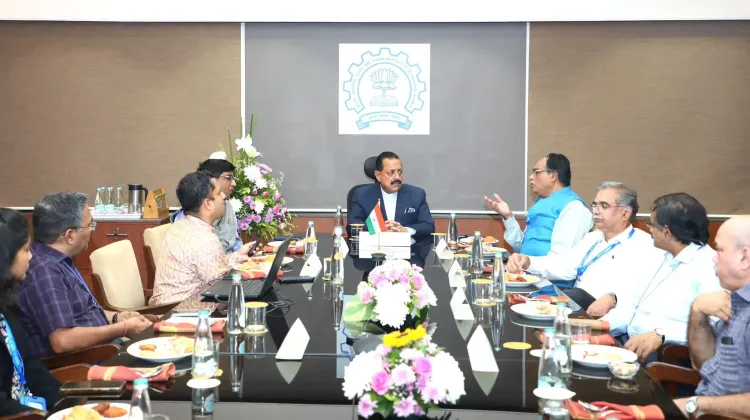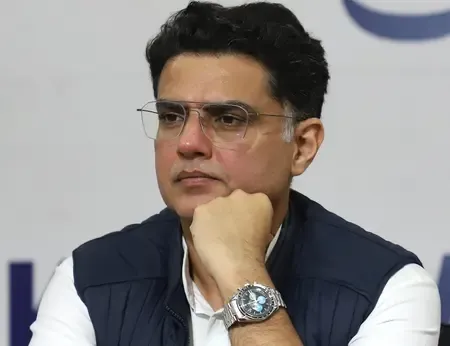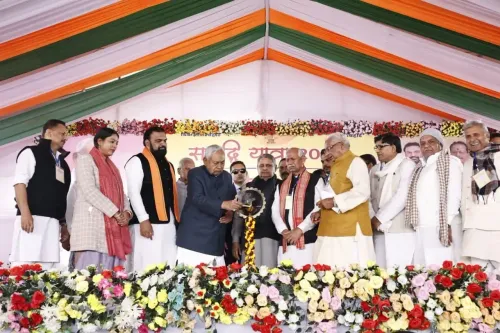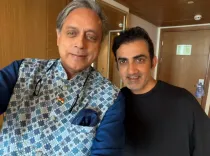Is BharatGen India's First Multilingual AI Model Set to Transform Governance?

Synopsis
Key Takeaways
- BharatGen is India's pioneering multilingual AI model.
- It supports over 22 Indian languages.
- Incorporates text, speech, and document vision modalities.
- Backed by ₹235 crore under the National Mission on Interdisciplinary Cyber-Physical Systems.
- Promotes technological self-reliance and empowerment for citizens.
New Delhi, Nov 25 (NationPress) The Union Minister of State (Independent Charge) for Science and Technology, Jitendra Singh, has praised BharatGen as the first sovereign multilingual and multimodal AI-driven Large Language Model in India.
During his visit to IIT Bombay, Singh asserted that BharatGen will play a pivotal role in revolutionizing governance and innovation within the country.
BharatGen stands as India’s inaugural sovereign initiative to develop a Large Language Model that genuinely embodies the country's linguistic, cultural, and social heterogeneity.
Designed to support more than twenty-two Indian languages, BharatGen integrates three primary modalities—text, speech, and document vision—enabling it to comprehend, produce, and interpret information in a manner that resonates with how Indian citizens communicate.
Singh commended the extensive scope, ambition, and technological sophistication of the BharatGen project, labeling it a watershed moment in India's pursuit of technological independence.
“BharatGen transcends mere technology; it is a national initiative aimed at ensuring that the future of AI encapsulates the dreams, languages, and experiences of 1.4 billion Indians,” he remarked.
The minister further highlighted that projects like BharatGen exemplify the Prime Minister’s vision to empower every citizen through science and technology, establishing systems that are inclusive, reliable, and locally relevant, thereby ensuring that India's digital narrative is crafted by Indians.
BharatGen is backed by the National Mission on Interdisciplinary Cyber-Physical Systems (NM-ICPS) of the Department of Science and Technology, with an investment of ₹235 crore funneled through the Technology Innovation Hub at IIT Bombay.
The consortium spearheaded by IIT Bombay features eminent institutions like IIT Madras, IIT Kanpur, IIIT Hyderabad, IIT Mandi, IIT Hyderabad, IIM Indore, IIT Kharagpur, and IIIT Delhi.
A significant element of BharatGen is the Bharat Data Sagar, one of the country’s most ambitious data initiatives.
This initiative is being developed to ensure India's complete ownership and governance over its digital knowledge resources.
The Minister also assessed the BharatGen models that have been launched thus far.
The team showcased Param-1, a foundational text model boasting 2.9 billion parameters trained on 7.5 trillion tokens, with over one-third of the training data comprised of Indian content.
BharatGen has also developed speech models such as Shrutam, a 30-million-parameter Automatic Speech Recognition system, and Sooktam, a 150-million-parameter Text-to-Speech model supporting nine Indic languages.
Moreover, the project has produced Patram, India’s first document-vision model featuring seven billion parameters, trained on 2.5 billion tokens, designed to comprehend and interpret intricate documents in Indian formats.
“These models collectively create a comprehensive AI stack for India—text, speech, and vision—capable of bolstering governance, industry, education, agriculture, healthcare, and digital inclusion,” Singh stated.









